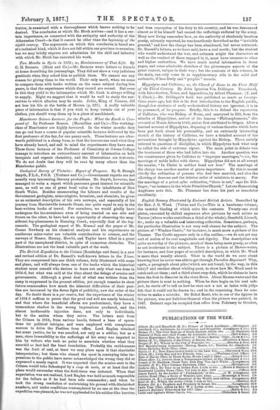Geological Survey of Victoria : Report of Progress. By R.
Brough Smyth, F.L.S., F.G.S. (Triibner and Co.)—Government reports are not usually very interesting literary productions. Mr. Smyth, however, has managed to write a report which possesses great interest for scientific men, as well as one of great local value to the inhabitants of New South Wales. Besides enumerating the labours and results of the Government geologists, mineralogists, botanists, and chemists, he gives us an animated description of his own surveys, and especially of his journey from Harrietville towards Grant, one quite equal to any in the best-written books of travel. For ourselves, we would gladly have undergone the inconvenience even of being roasted on one side and frozen on the other, to have had an opportunity of observing the mag- nificent fog-phenomena in Running Creek, especially that of the fog- cascade. The geological report of Mr. Krause and the paper of Mr. Cosmo Newbury on his chemical analysis and his experiments on auriferous mine-water are valuable contributions to science, and the surveys of Messrs. Murray, Hewitt, and Taylor have filled in a great part of the unexplored district, in spite of numerous obstacles. The illustrations are not the least valuable part of the work.
The British Expedition to the Crimea (Rontledge and Sons) is a new and revised edition of Dr. Russell's well-known letters to the Times. They are compressed into one thick volume, duly illustrated with maps and plans, and will always form one of the books which the historical student must consult who desires to learn not only what was done in 1854-6, but what was said at the time about the doings of armies and governments. Although a great deal of what was- written from the camp is suppressed in the present edition, yet enough remains to show future commanders how much the inherent difficulties of their posi- tion are increased by the fierce light of publicity, now the order of the day. No doubt there is a per contra, but the experience of the winter of 1851-5 suffices to prove that the good and evil are nearly balanced, and that where the beneficial effects are predominant, they have a tremendous shadow in the wrong impressions produced, and the almost ineffaceable injustice done, not only to individuals, but to the nation whom they serve. The letters sent from the Crimea in 1854, from various hand; formed a base of opera- tions for political intrigue, and were employed with conspicuous success to drive the Peelites from office. Lord Raglan obtained but scant justice, for he was assailed, not only as a soldier, but as a man, since insensibility to the sufferings of his army was imputed to him by writers who took no pains to ascertain whether what they assertfed as fact had the least foundation. Probably the recklessness was the fruit of zeal, at least we may place upon it that charitable interpretation ; but those who sinned the most in conveying false im- pressions to the public have never acknowledged the wrong they did or expressed a manly regret. It was expected that the armies sent to the Crimea would take Sebastopol by a coup de main, or at least that the place would surrender when the field-force was defeated. When that expectation was not realised, Lord Raglan was held as much responsible for the failure as if he had been sole commander ; and when he took the strong resolution of maintaining his ground with diminished numbers, and under conditions contemplated by no one at the time the expedition was planned, he was not applauded for his soldier-like heroism and trim conception of his duty to his country, and he was denounced almost as if he himself had caused the sufferings endured by the army. Many now living remember how, on the authority of absolutely baseless gossip, solemnly reported, he was heartlessly described as the "invisible general," and how the charge has been abandoned, but never retracted. Dr. Russell's letters, as we have said, have a real merit ; but the student who would understand the war, and estimate aright the characters as well as the conduct of those engaged in it, must have recourse to other and higher authorities. We have much useful information in these pages, and some admirable sketches of the picturesque aspects of the great contest, unique in their way; but the contents of this volume, in the main, can only come in as supplementary aids to the solid and authentic, if less lively and " graphic " records.






































 Previous page
Previous page